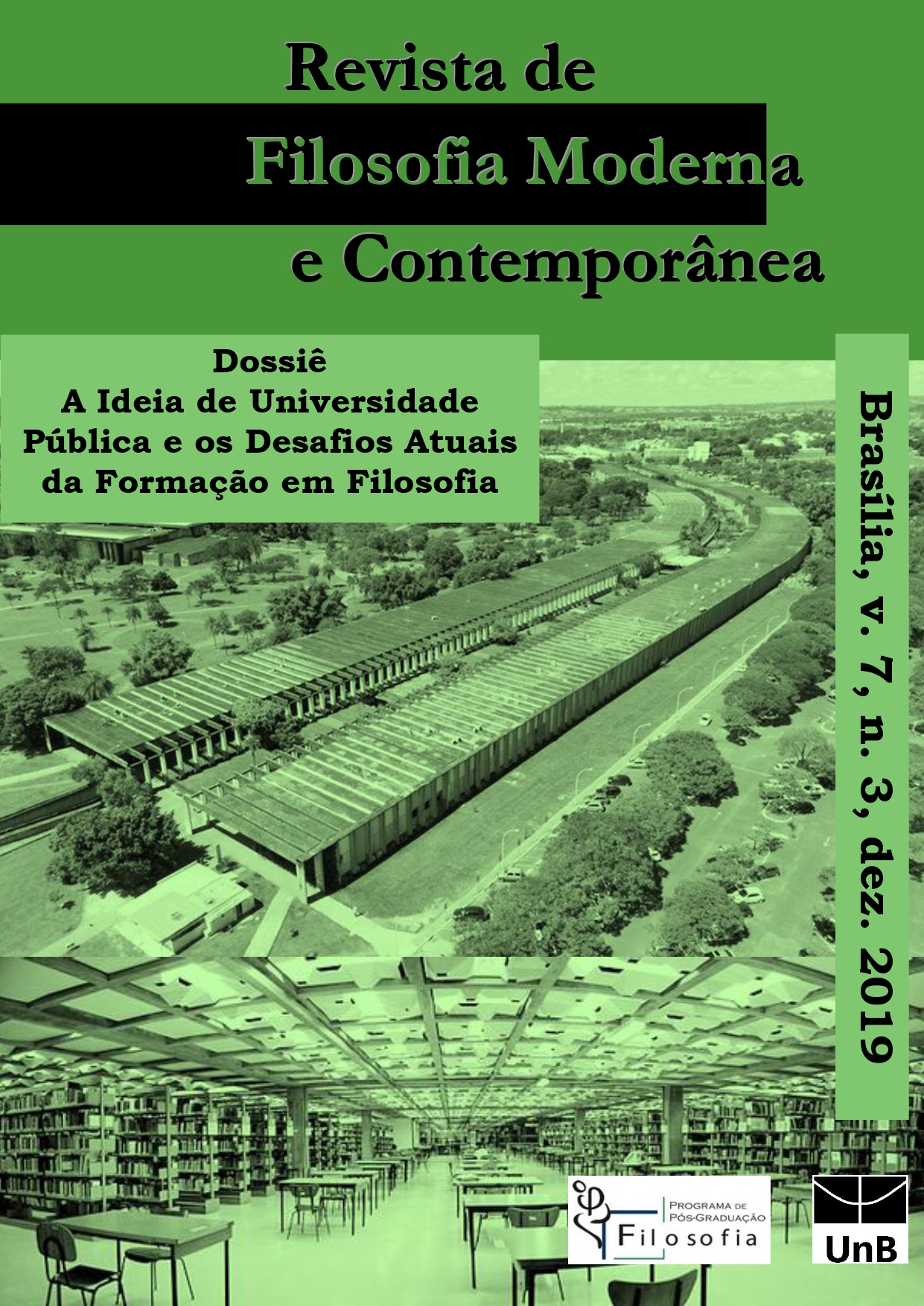Pequeno Manual da Máquina Educacional Moderna: Acompanhado de um Excurso sobre a Situação Atual da Mesma
DOI:
https://doi.org/10.26512/rfmc.v7i3.27505Palabras clave:
Universidade, máquina (tropo), BildungResumen
O texto reúne fragmentos do maquinário filosófico moderno voltado para a crítica do ensino institucionalizado (e em especial da Universidade) como uma espécie de máquina subordinada à grande máquina estatal. Acompanhando o desenvolvimento desse tropo em escritos sobre a sociedade e suas instituições ao longo da modernidade, de Herder a Foucault, procura-se reconstruir a função que ele exerceu na formulação de um discurso crítico sobre um modelo específico de Universidade como instituição pública. A segunda parte do artigo parte do Post-scriptum sobre as sociedades de controle de Deleuze para apontar certos sinais de que, como o próprio Estado, a Universidade passa por uma transformação profunda, que exige uma mudança correspondente na estratégia do discurso crítico associado a ela.
Descargas
Citas
ADORNO, T. W., HORKHEIMER, M. Dialektik der Aufklärung. Philosophische Fragmente. Frankfurt a.M.: S. Fischer, 1969.
DELEUZE, G. Contrôle et devenir in: Pourparlers. Paris: Éditions de Minuit, 2003.
DELEUZE, G., Post-scriptum sur les sociétés de contrôle in: Pourparlers. Paris: Éditions de Minuit, 20032.
DELEUZE, G., GUATTARI, F. Capitalisme et schizophrénie 2. Mille plateaux. Paris: Éditions de Minuit, 1980.
DERRIDA, J. Otobiographies. L’enseignement de Nietzsche et la politique du nom propre. Paris: Éditions Galilée, 2005.
FOUCAULT, M. Surveiller et punir. Naissance de la prison. Paris : Gallimard, 1975.
FOUCAULT, M. Qu’est-ce que les lumières? in: Dits et écrits, IV, Paris: Gallimard, 1994.
HERDER, J. G. Vom Einfluss der Regierung auf die Wissenschaften und der Wissenschaften auf die Regierung in: Herders Werke in fünf Bänden, 3, Berlim/Weimar: Aufbau, 1982.
HERDER, J. G. Auch eine Philosophie der Geschichte zur Bildung der Menschheit in: Idem. Werke in zehn Bänden, 4, Frankfurt a.M.: Deutscher Klassiker Verlag, 1994.
HOBBES, T. Leviathan in: The English Works of Thomas Hobbes of Malmesbury, III. Aalen: Scientia, 1962.
HUMBOLDT, W. Ideen zu einem Versuch die Grenzen der Wirksamkeit des Staats zu bestimmen in: Gesammelte Schriften, I. Berlim: B. Behr, 1903.
HUMBOLDT, W. Über die innere und äußere Organisation der höheren wissenschaftlichen Anstalten in Berlin in: Gesammelte Schriften, X. Berlim: B. Behr, 19032.
KANT, I. Beantwortung der Frage: Was ist Aufklärung? in: Idem. Werkausgabe, XI. Frankfurt a.M.: Suhrkamp, 1977.
MARCUSE, H. Staat und Individuum im Nationalsozialismus. taz.de, 2000. Disponível em [http://www/taz.de/!1207627/]: acessado em [19/12/2018]. Traduzido do inglês por Michael Haupt.
MARX, K. Das Kapital. Kritik der politischen Ökonomie, 1 in: Karl Marx Friedrich Engels Gesamtausgabe, II,10. Berlim: Akademie Verlag, 1991.
MENDELSSOHN, M. Über die Frage: Was heißt Aufklärung? in: Gesammelte Schriften, 6,1. Stuttgart/Bad Cannstatt: frommann-holzboog, 1981.
MENDELSSOHN, M. Briefwechsel III in: Gesammelte Schriften, 13. Stuttgart/Bad Cannstatt: frommann-holzboog, 19812.
NIETZSCHE, F. Vom Nutzen und Nachteil der Historie für das Leben in: Werke. Kritische Gesamtausgabe, III,1. Berlim/Nova Iorque: De Gruyter, 1972.
NIETZSCHE, F. Über die Zukunft unserer Bildungsanstalten in: Werke. Kritische Gesamtausgabe, III,2. Berlim/Nova Iorque: De Gruyter, 1973.
SCHOPENHAUER, A. Die Welt als Wille und Vorstellung, I in: Züricher Ausgabe. Werke in zehn Bänden, I/II. Zurique: Diogenes, 1977.
SCHOPENHAUER, A. Die Welt als Wille und Vorstellung, II in: Züricher Ausgabe. Werke in zehn Bänden, II/III. Zurique: Diogenes, 19772.
SCHOPENHAUER, A. Ueber die Universitäts-Philosophie in: Züricher Ausgabe. Werke in zehn Bänden, VII. Zurique: Diogenes, 19773.
SCHOPENHAUER, A. Parerga und Paralipomena II in: Züricher Ausgabe. Werke in zehn Bänden, IX/X. Zurique: Diogenes, 19774.
STALIN, J. Über die Grundlagen des Leninismus. Vorlesungen gehalten an der Swerelow-Universität Anfang April 1924 in: Über die Grundlagen des Leninismus; Zu den Fragen des Leninismus. Berlim: Neuer Weg, 1946.
Descargas
Publicado
Cómo citar
Número
Sección
Licencia
Los derechos de autor para artículos publicados en esta revista son del autor, con derechos de primera publicación para la revista. Debido a que aparecen en esta revista de acceso público, los artículos son de uso gratuito, con atribuciones propias, en aplicaciones educativas y no comerciales.


